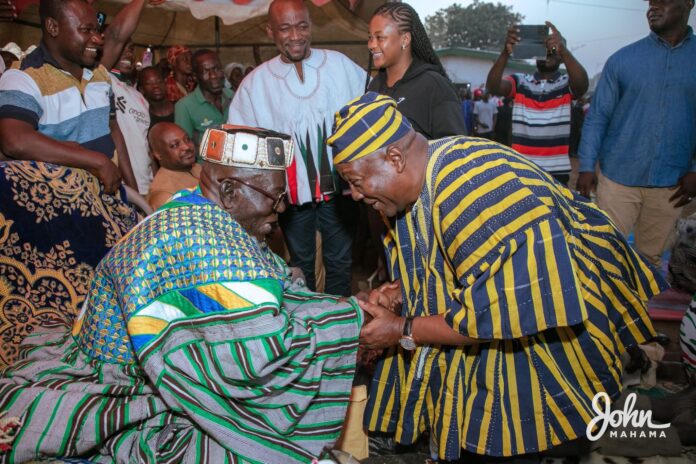By Dr Sheriff Adam
In the annals of history, true leaders are often those who dare to defy convention for the greater good. Bolewura Sarfo Kutugefeso I, the revered chief of Bole, recently etched his name into this league of courageous leaders. His public endorsement of former President John Dramani Mahama, a proud son of Bole, was a rare act of conviction that transcended Ghana’s constitutional injunction against the involvement of traditional authorities in active politics. While some viewed this as a breach of protocol, others, inspired by Aristotle’s maxim that “courage is the first of human qualities because it is the quality which guarantees the others,” saw it as a bold affirmation of leadership.
By endorsing Mahama, the Bolewura did not simply declare a political preference; he demonstrated the essence of leadership as an act of sacrifice. Plato, in his seminal work The Republic, asserted that “the heaviest penalty for declining to rule is to be ruled by someone inferior.” The Bolewura understood that in moments of critical decision, silence could be misconstrued as complicity. His decision to speak was a reflection of his desire to safeguard the development and dignity of his people, even at the risk of political backlash.
Had the New Patriotic Party (NPP) emerged victorious in the last elections, the Bolewura’s choice could have resulted in severe consequences, including political ostracism or vilification. Yet, he stood firm, embodying the Aristotelian ideal of a statesman—one who acts for the common good, unshaken by personal loss.
The Bolewura’s actions also compel us to reflect on the evolving role of traditional leaders in contemporary governance. Should chiefs, whose influence often extends beyond their communities, remain silent in the face of decisions that affect their people? Socrates once mused that “an unexamined life is not worth living.” Similarly, an unengaged leadership, one that avoids confronting the pressing needs of its people, is leadership in name only.
By openly supporting John Mahama, Bolewura Kutugefeso I bridged the often rigid divide between tradition and modern governance. His endorsement was not a mere partisan act; it was an affirmation of his faith in Mahama’s vision for a united and prosperous Ghana. It was a reminder that traditional leadership, though bound by constitutional guidelines, cannot be divorced from the aspirations of the people it serves.
Leadership, as the ancient Greeks understood, is often a lonely path. “He who is not a good servant will not be a good master,” wrote the philosopher Epictetus, emphasizing that the essence of leadership lies in service. The Bolewura’s act was one of service—to his community, to the Gonja land, and to the larger vision of national progress.
His courage in putting his reputation on the line is a powerful example of what it means to lead with integrity. At a time when many would shy away from controversy, he chose to embrace it, fully aware of the potential repercussions. This courage is a testament to his belief that leadership demands action, not passivity.
As Ghana continues its democratic journey, the Bolewura’s bold stand invites us to revisit the role of traditional authorities in shaping national discourse. Should their voices remain silent when their communities’ futures are at stake? Or should they, like the Bolewura, dare to lead in the face of uncertainty?
Bolewura Sarfo Kutugefeso I has left an indelible mark. Like the philosophers of old, his actions teach us that “the only thing necessary for the triumph of evil is for good men to do nothing” (a sentiment echoed by Edmund Burke, though inspired by earlier wisdom). His legacy is not merely one of defiance but of a leader who dared to prioritize the collective good over personal safety.
In honoring his courage, we honor the timeless values of integrity, service, and sacrifice. For his people and for Ghana, the Bolewura has shown that true leadership is not about avoiding challenges but confronting them with unwavering conviction. As the dust settles, his legacy will stand as a testament to what it means to lead with purpose in a world often dominated by fear and compromise.
30th December, 2024.



